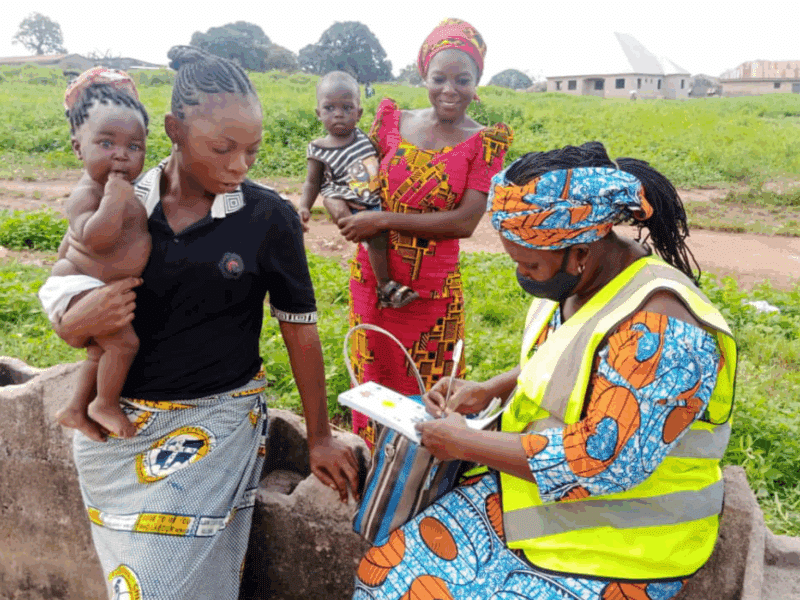In a world with more than two million COVID-19 cases and more than 130,000 deaths, health systems around the world have an understandable single focus right now: Limiting the impact of the pandemic.
But there are other important health issues with real consequences that can’t be ignored, notably family planning and reproductive health services, which are already being impacted in some countries due to disruptions to supply chains of contraceptive commodities, closures of health clinics and public fear about visiting health facilities. Allowing recent successes in increased access and uptake of modern family planning to falter during the current pandemic could have serious long-term consequences, experts say.
On Thursday, April 23, the Johns Hopkins Center for Communication Programs-led Breakthrough ACTION project is hosting “Maintaining momentum in family planning: How can social and behavior change programs adapt to the new reality of COVID-19?” This webinar will look at the need to find new ways to engage communities under lockdown, identify specific needs of sub-populations such as youth and adapt messaging in response to shifting access to family planning and reproductive health services.
“We are facing a long-term crisis if we don’t act now to meet the sexual and reproductive health needs of women and girls,” says CCP’s Joanna Skinner, the family planning technical lead for Breakthrough ACTION. “Family planning is a lifesaving intervention and we need to protect that service in order to avoid increased morbidity and mortality resulting from unintended pregnancies.”
Last week, the journal International Perspectives on Sexual and Reproductive Health, published a piece estimating the potential impact of the COVID-19 pandemic on reproductive health in low- and middle-income countries. “We estimate that a 10% proportional decline in use of short- and long-acting reversible contraceptive methods in LMICs due to reduced access would result in an additional 49 million women with an unmet need for modern contraceptives and an additional 15 million unintended pregnancies over the course of a year,” the researchers wrote.
These impacts have also been seen during past health crises. During the Ebola outbreak in West Africa in 2014 and 2015, for example, unintended pregnancies among adolescents in Sierra Leone rose dramatically and led to long-term consequences for girls’ education.
Many of the social and behavior change interventions led by CCP and other organizations include community engagement, speaking face-to-face or in small groups with women and families about the many benefits of birth spacing and about contraceptive options. Stay-at-home orders, massive job losses, school closures and fear of seeking out anything but the most urgent medical care are changing the way these groups must work.
To that end, Breakthrough ACTION has developed a “Guidance on Social and Behavior Change for Family Planning During COVID-19.” This short guide includes important considerations, messages and resources to support country programs in adapting their family planning and reproductive health-focused SBC programming in response to the challenges presented by COVID-19. Read it here in French.
The guidance is needed, according to its authors, to help social and behavior change practitioners “adapt messages about family planning to ensure they resonate with the audience’s current emotional state and provide calls to action that are practical in the reality of their new daily lives.
“SBC practitioners must also find new ways of working that follow physical distancing guidelines while reaching audiences via trusted sources. And they must do this while ensuring that voluntarism and informed choice remain central to all family planning information and counseling.”
In some cases, interventions are being adapted to include information hotlines and online counseling. These services can remind women that there are short-term family planning methods such as oral contraceptives and condoms available at pharmacies if they can’t receive their preferred long-acting contraception at a medical facility for the time being. Other creative solutions are being discussed.
As for messages, one suggestion, for example, is to increase feelings of empowerment by promoting positive self-care for family planning, including promoting methods that are easier to access such as pills, condoms, emergency contraception and, where available, injections. For example, “Even in these difficult times, you can decide if and when you want to get pregnant. If you can’t access a health care provider right now, use a short-term method available from your local pharmacy.”
Another example suggests leveraging the important influence of peers for young people who may be facing pressure to continue normal activities instead of remaining at home. For example, “Remind your friends that keeping physical distance is important during the time of the coronavirus pandemic. Encourage them to stay safe now. Physical love can wait!”
The webinar, which will be moderated by CCP’s Lynn Van Lith, will feature Skinner; Beth Schlachter, the executive director of FP2020; John Skibiak, director of the Reproductive Health Supplies Coalition; and Manasa Priya Vasudevan, program manager of the Know Your Body, Know Your Rights Program.
To register for the webinar, click here. It will be conducted in English with simultaneous translation into French.





